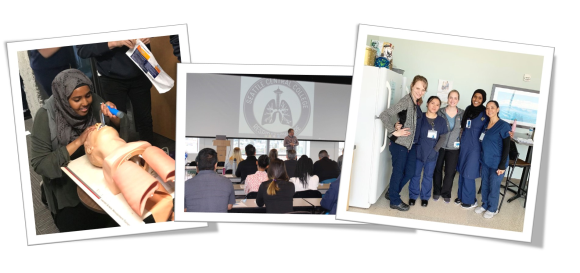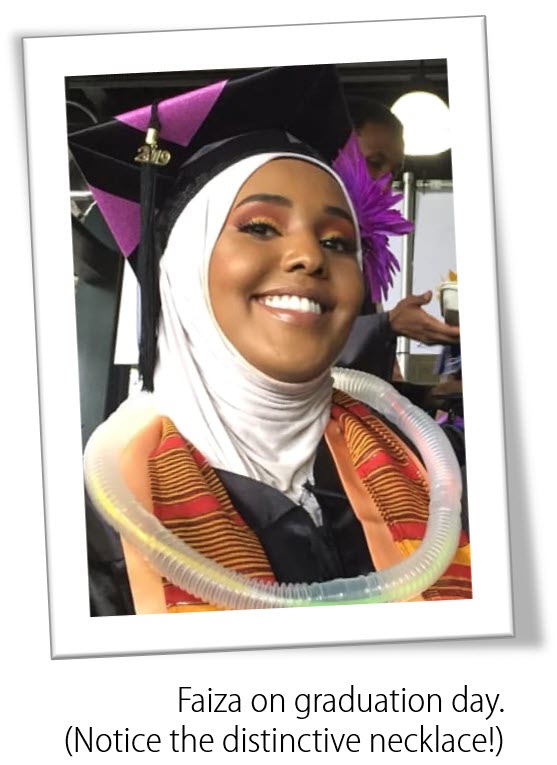Recent Respiratory Therapy grad thrust to frontlines of COVID-19 crisis

Faiza Mohamed graduated from Seattle Central's Respiratory Therapy program in 2019. She never could have imagined her first year in the profession.
May 21, 2020
Asked what prompted her to become a Respiratory Therapist, Faiza Mohamed is quick with an answer: Her mother’s sudden, frightening diagnosis with asthma, at age 57.
Everyone was shocked when, out of the blue, the family matriarch began having terrible wheezing attacks, fighting to breathe. After several frantic trips to the hospital, doctors finally diagnosed adult-onset asthma, and sent the family home with breathing equipment for future incidents.
The equipment’s complexity was overwhelming. But not to Faiza, who quickly mastered it, and then patiently taught her mom and other family members. She was relieved that, next time, her mother would be able to get quick, maybe life-saving, relief.
Faiza’s devotion to her family is strong — hardly surprising, given all they’ve gone through together. When Faiza was only a year old, they left Somalia seeking a better life, first going to Yemen and Syria, and then finally the United States. Here they’ve thrived. One sister has become a teacher. The other two work at Amazon: one in IT, the other in sales.
 Faiza graduated in 2019 from one of the growing number of 4-year programs at Seattle Central College. She earned a Bachelor’s in Applied Science in Respiratory Therapy. Even before graduating she was offered a job at Swedish.
Faiza graduated in 2019 from one of the growing number of 4-year programs at Seattle Central College. She earned a Bachelor’s in Applied Science in Respiratory Therapy. Even before graduating she was offered a job at Swedish.
Asked if the program prepared her for the trials of today’s coronavirus crisis, Faiza’s answer is an emphatic Yes. Not only did she and her classmates learn about what a pandemic could demand, she says. The program also instilled skills that, even in extreme stress, kick in like muscle memory.
And make no mistake, there has been extreme stress. Faiza recalls taking off personal protective equipment (PPE) after leaving the room of a COVID-19 patient. But then sensors blared that the patient’s oxygen level had plunged. Getting back into PPE safely takes multiple people, and there wasn’t a second to spare. But she made it and stabilized the patient.
Given how close she is to her sisters and parents, Faiza is heartbroken that some COVID-19 patients die without seeing their families again. So she does all she can to facilitate Skype and FaceTime calls.
She tells the story of one desperately ill patient who spent weeks in the ICU, three weeks of them on a ventilator. His wife summoned their grown children home, where they waited with dread for the hospital’s call.
Then it came, by FaceTime.
It was Faiza. And beside her — remarkably — the smiling patient: Off the ventilator, scratchy-voiced, weak. But okay. He’d made it through. “A moment I won’t ever forget,” says Faiza.
These days Faiza makes a lot of personal use of FaceTime. It’s how she keeps in touch with her own family. “Hard as we try at the hospital, I could still pick up the virus, she says. I can’t take the chance of passing it along. It’s hard not touch the people I love. But the sacrifice feels worth it. I think I’m doing something meaningful. And I’m so grateful for the education that made it possible."
Press Contact
Michael Beneke | Director of Communications
Seattle Colleges Foundation
206/250-4993 | michael.beneke@seattlecolleges.edu
Give Online
https://foundation.seattlecolleges.edu/covid-19-emergency-fund